Combat Stress 100
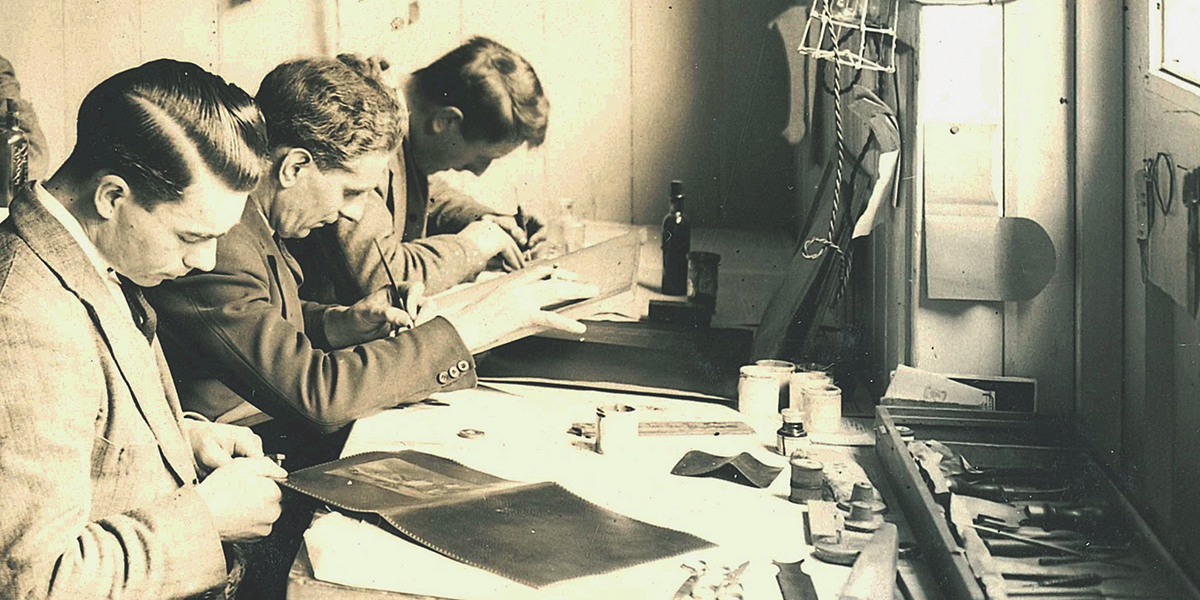
In May 2019 Age Exchange joined with the military mental health charity Combat Stress to create a nationwide programme to mark its centenary. Combat Stress 100 has aimed not only to share the remarkable history of Combat Stress but to engage with veterans and their families, enabling them to share their own story. All those who have taken part have done so because they want the public to understand how military service related PTSD impacts on those who serve on the front line and on those closest to them. Along with raising the profile of Combat Stress in its centenary year veterans and families have bravely come forward to share often painful and harrowing experience in order to further the cause of destigmatising mental illness.
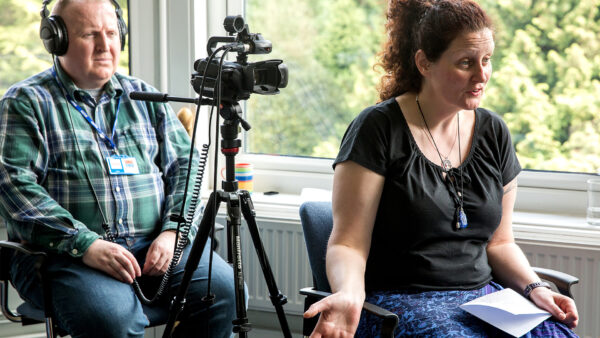
Project background
Combat Stress 100 has been a veterans led project in every sense. It began with Age Exchange training eight veteran volunteers to the project (back in May/June 2019), in oral history interview technique, using film cameras and sound equipment, as well as digitising archive materials. This brilliant team then worked with us in partner venues across the UK carrying out 73 interviews with veterans, family members and Combat Stress Staff. 61 of the interviews have been with veterans who have been supported by Combat Stress. Interviews have taken place in Combat Stress treatment centres at Tyrwhitt House and Audley Court in England and Hollybush House in Scotland, and at National Museums Liverpool, Tyne & Wear Museums, St Helens RFC, Leeds Rhinos RFC, Queens University Belfast, and the National Museum of the Royal Navy.
The Combat Stress 100 Steering Group including Combat Stress Staff and veterans, and Age Exchange project leaders played a crucial role in identifying themes for the interview process. Veteran volunteers and clinical and support staff at Combat Stress helped shape the interview questions which were then used right across the UK.
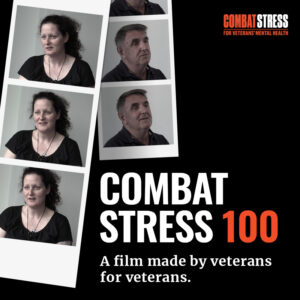
Combat Stress 100 film
Over 50 hours of interviews have been edited into a one-hour documentary. There was an overwhelmingly positive response to the film by the veteran’s community who feel it reflects their experience of service and of PTSD faithfully.
The film Combat Stress 100 premiered back in November 2019 as part of Armistice Commemorations at National Museums Liverpool, followed by screenings at Bentley Priory Museum and Merton Heritage Centre. There has been an overwhelmingly positive response to the film by the veteran’s community who feel it reflects their experience of service and of PTSD faithfully. Families of veterans have also been in touch to say how pleased they are that veterans have made a film about their PTSD and spoken so openly and honestly about the impact on themselves and on their families. If you would like to see feedback we have received please get in touch via hello@age-exchange.org.uk
Then we begin work on the next stages of the centenary project in February. Veterans have been trained to work in 4 secondary schools, to share their story face to face with students, supported also by interview edits from other veteran’s interviews from the project. The students will create a series of art works, spoken word, and film, in response to what they learn from Combat Stress veterans. This will result in a special sharing day at The National Army Museum on May 7th. Again to find out more contact Age Exchange via our email above.
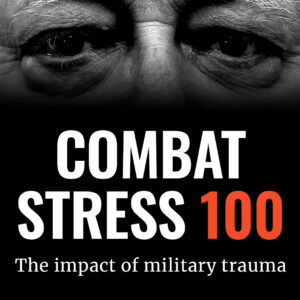
Combat Stress 100 Podcasts
And Mental Health Week in May will also saw the launch of a series of 7 X 25 minute podcasts created by one of our project veterans working with Age Exchange. The podcasts will share more of the recorded interview material from veterans we met across the UK. Podcasts will cover themes including: enlisting and basic training, service and combat experience, trauma related incidents and treatment by Combat Stress.
Age Exchange is delighted to announce that a series of 6 Combat Stress 100 podcasts is available to download. Over this six-episode series, you’ll hear the heartrending true stories of UK military veterans who experienced extraordinary events and survived, but not without consequences; post-traumatic stress disorder (PTSD), depression and, for some, substance misuse. The episodes combine material from interviews carried out by Age Exchange with veteran volunteers it trained in interview technique and film making (who then interviewed 61 veterans around the UK), with interviews with clinicians, therapists and veterans’ family members.
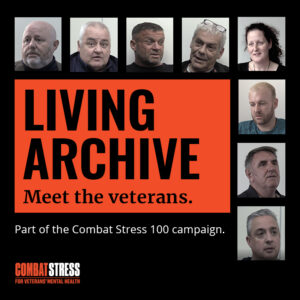
The Living Archive
At the end of this remarkable project Combat Stress with Age Exchange will have created and launched The Living Archive. Despite its 100 year history Combat Stress before its centenary programme, did not contain the recorded voices of veterans it has treated. Combat Stress 100 has changed that. Our filmed interviews with veterans treated for PTSD and other mental health conditions will form the foundations of an archive that will grow beyond this project supported by trained veteran volunteers. This archive will be there in future years for veterans, for researchers, for families and for the public to learn about the work of Combat Stress and better understand the impact of PTSD on those who serve in the military and their families.
Please watch this space for more information on Combat Stress 100 as the project develops and more opportunities to experience it, attend events present themselves.
When Combat Stress 100 was launched back in May last year
Sue Freeth, Chief Executive of Combat Stress, said:
“We’re very excited to be partnering with Age Exchange for what is an invaluable opportunity to share the stories of veterans and their families who will convey in their own words the impact of living with military-related mental health. By creating a living archive of veterans’ stories, as well as those of their loved ones, we aim to further reduce the barrier to seeking help and increase the public understanding and respect for the impact on individual’s lives.”
David Savill, Artistic Director of Age Exchange, said:
“We are absolutely delighted to be working in partnership with Combat Stress during its centenary year. Age Exchange is honoured to be working with veterans and their families to create a nationwide project which will enable the UK public to learn about and engage in the remarkable history of the charity and its ground-breaking work supporting military veterans for 100 years. Age Exchange comes to Combat Stress 100 having delivered two National Lottery funded projects as part of the First World War Centenary programme. Projects in the UK and in Germany explored the theme of the legacy of war in families, working with British and German children and grandchildren of First World War combatants. Both projects and the learning from them have played a key part in the thinking behind Combat Stress 100 and the partnership between our organisations. Combat Stress and Age Exchange would like to thank The National Lottery Heritage Fund for funding Combat Stress 100.”
Read the latest article in the spring issue of Combat Stress magazine.
If you would like to find out more about Combat Stress or are a veteran and would like to contact them please go towww.combatstress.org.uk/about-us


